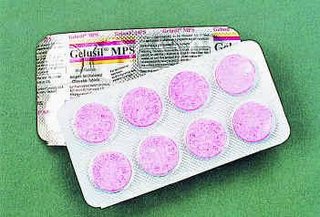Brand: Gelusil
Company: Pfizer
Agency: Contract
Company: Pfizer
Agency: Contract
Brand Count:105
Gelusil is one of the major brands in the 220 crore antacid market in India . A brand once owned by Parke-Davis came into Pfizers hand when the two companies merged. Ge lusil was promoted through ethical route where the drugs are to be sold only through prescription. This 30 year old brand had a strong support from the medical community and is worth Rs 20 crore.
lusil was promoted through ethical route where the drugs are to be sold only through prescription. This 30 year old brand had a strong support from the medical community and is worth Rs 20 crore.
In 1999 Gelusil became the first antacid brand to shift from ethical route to OTC. It was a risky move since there was a chance of alienating the medical practitioners and also doubts about the ad spent that is needed to promote such a mass market product.
 lusil was promoted through ethical route where the drugs are to be sold only through prescription. This 30 year old brand had a strong support from the medical community and is worth Rs 20 crore.
lusil was promoted through ethical route where the drugs are to be sold only through prescription. This 30 year old brand had a strong support from the medical community and is worth Rs 20 crore.In 1999 Gelusil became the first antacid brand to shift from ethical route to OTC. It was a risky move since there was a chance of alienating the medical practitioners and also doubts about the ad spent that is needed to promote such a mass market product.
The antacid market in India is crowded with lot of products fighting for their share of the pie. The market leader is Digene from Abbot Pharma with a market share of 35% followed by Eno from GSK with 24% , Gelusil with 21% and Pudin Hara with 14%. Digene is still sold through the ethical route and are available only at the Chemists. Eno and Pudin Hara are available in all shops since they are ayurvedic products.
Globally antacids are sold as OTC products. The market is expected to grow faster in India because of the " changed" lifestyle of less exercise and more junk foods. Right now in the OTC segment, growth is now taken more by the ayurvedic products rather than products like Gelusil because of the association of " no side effects" with ayurvedic products.
Gelusil faced a setback in 2004 when Pfizer had to recall its liquid form because of odour problem. Gelusil have some issues with its taste as it may not be liked by some of the customers ( including me). For that matter all antacids tastes bad. Since this product is now sold through OTC, the share of mind and share of voice is crucial for maintaining and building market share. The creatives of Gelusil were critically acclaimed with one ad winning at the ABBY's.
With a huge potential for antacids in the future, Gelusil has to get more aggressive to leap from the solid foundation it had created .
Source: Businessline, agencyfaqs, magindia, companywebsite.





